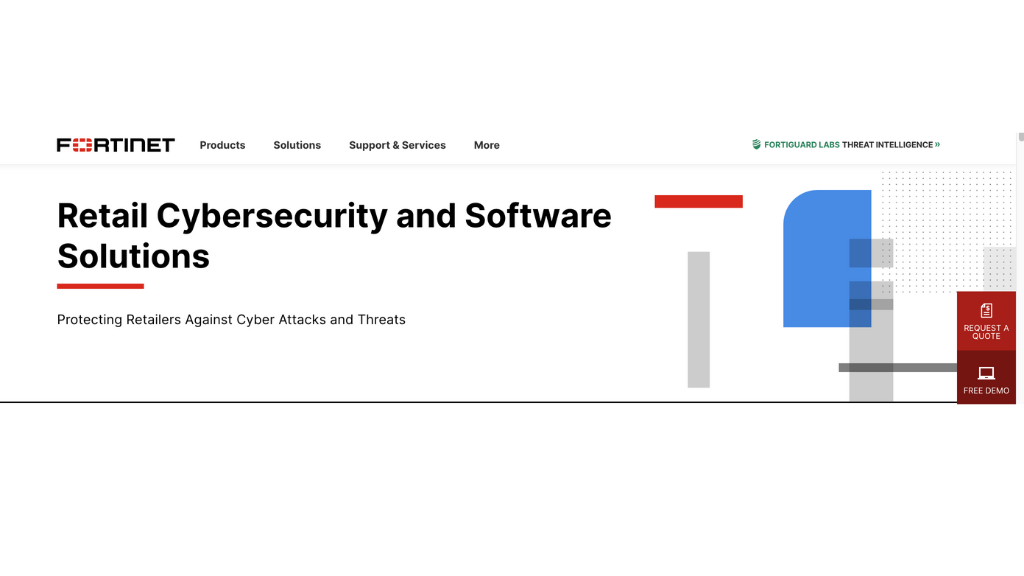Cybersecurity has become an indispensable part of modern businesses, and when it comes to the retail industry, it’s nothing short of crucial. Retail cybersecurity is the discipline dedicated to safeguarding retail operations, data, and customers from digital threats, a task that’s become significantly challenging due to an alarming increase in cyber threats. This comprehensive guide will walk you through the intricate world of retail cybersecurity, offering insights, analyses, and advice.
Retail Cybersecurity: A Modern Imperative
Retail cybersecurity is, without a doubt, a multifaceted concept that encompasses a wide range of critical aspects. These aspects span network security, data protection, access controls, and incident response. By implementing and deploying a robust shield, retail businesses can effectively fortify themselves against various cyber threats. As a result, they can ensure their resilience and sustainability in an ever-evolving digital marketplace. Now, let’s take a closer look and delve deeper into this comprehensive concept to understand its immense significance and far-reaching implications better.

Also, Check: How to Prevent Cyber Attacks in Healthcare: A Comprehensive Guide
Why Retail Cybersecurity Matters
Retailers have undoubtedly become prime targets for cybercriminals due to the abundance of sensitive data they handle. In fact, recent statistics from Trust Wave reveal that a significant 24% of cyberattacks specifically target retailers, surpassing other industries. These alarming numbers underscore the critical importance of implementing an effective and robust cybersecurity strategy within the retail sector. With such a strategy in place, retailers can better defend themselves against the ever-growing threat landscape and safeguard their valuable data and customer information.
Understanding the Cyber Threat Landscape in Retail
Threat actors employ a diverse array of tactics to target retail businesses, such as data breaches, ransomware attacks, and more. In order to mount an effective defense against these sophisticated threats, retail companies must possess an in-depth understanding of the constantly evolving threat landscape and the strategies utilized by cunning cybercriminals. By staying informed and vigilant, retailers can proactively fortify their cybersecurity measures and protect their valuable assets, customer data, and reputation from malicious actors.
Cyber Threats to the Retail Industry
Retailers face a broad range of cyber threats, each carrying unique risks and potential damages. Understanding these threats is the first step towards effective cybersecurity.
Retail Data Breaches
Recent data breaches in the retail sector have served as stark reminders of the vulnerability retailers face against these insidious attacks. Such breaches typically entail the theft of highly sensitive customer data, including credit card information and personal details. The repercussions of these breaches can be far-reaching, potentially resulting in significant financial losses and severe damage to the brand’s reputation. It is evident that robust cybersecurity measures are crucial for retailers to mitigate these risks and protect both their customers and their own business interests.
Retail Ransomware Attacks
Ransomware attacks in retail have been steadily increasing. Cybercriminals lock down critical systems or data, demanding a ransom in exchange for its release. The consequences can be dire, ranging from temporary shutdowns to significant financial and reputational damage.
The Biggest Retail Data Breaches: Lessons Learned
A closer look at some of the most significant retail data breaches provides a clear understanding of the potential risks and the measures needed to prevent similar incidents.
Case Study: Big Box Store Breach
In one of the most significant retail data breaches to date, the attackers gained access to a leading retailer’s payment systems, stealing millions of customers’ credit and debit card information. This incident emphasized the necessity of robust data protection and payment security measures in retail.
Case Study: E-commerce Giant’s Data Leak
In another instance, an e-commerce giant suffered a data leak, leading to the exposure of the personal information of countless customers. The incident highlighted the importance of secure cloud storage and data management practices.
Retail Cybersecurity Solutions: Tools and Techniques
The complexities of the retail industry require an array of tools and techniques for effective cybersecurity. Let’s explore some of these solutions.
Implementing Network Security with Fortinet Retail

Fortinet Retail provides various network security solutions tailored to the retail industry. From secure SD-WAN for retail stores to next-generation firewalls, these solutions can significantly boost the cybersecurity posture of retail businesses.
Emphasizing Access Controls
Implementing strict access controls can significantly reduce the chances of unauthorized data access. Retailers can thwart many potential data breaches by ensuring that only authorized individuals can access sensitive data.
Enhancing Incident Response
A swift and effective incident response is crucial in minimizing the damage of a cyberattack. An incident response plan should include identification, containment, eradication, recovery, and lessons learned stages to ensure a comprehensive response to cyber threats.
Retail Risk and Cyber Insurance
Given the high stakes involved in retail cybersecurity, it is imperative for retailers to include cyber insurance as an integral part of their overall strategy. By doing so, they can effectively mitigate the potential financial impact of a cyberattack, thus providing a much-needed safety net to cope with potentially crippling expenses. Cyber insurance serves as a proactive measure to safeguard retailers from the substantial financial burden that may arise from dealing with the aftermath of a successful cyber intrusion. It offers a sense of security and confidence, allowing retailers to focus on bolstering their cybersecurity defenses and maintaining the trust of their customers in an ever-challenging digital landscape.
Assessing Retail Risks
Retail risks include everything from cyber threats and data breaches to operational and financial risks. Assessing these risks is the first step in deciding the coverage needed for adequate cyber insurance.
Benefits of Cyber Insurance
Cyber insurance can cover the costs associated with a cyberattack, such as investigation, business interruption, public relations, and legal expenses. While it doesn’t prevent cyberattacks, it provides financial support in the aftermath.

Retail Cybersecurity: A Continuing Journey
Retail cybersecurity is a dynamic, ever-evolving field that requires constant vigilance, continuous learning, and regular updates to strategies and tools. By staying informed about the latest threats and solutions, retailers can stay one step ahead of cybercriminals and secure their business in the digital landscape.
Conclusion
In the digital age, retail cybersecurity is no longer an option but a necessity. Retail cybersecurity plays a pivotal role in protecting sensitive customer data and ensuring business continuity. Despite the challenges, retailers can significantly enhance their cybersecurity posture by adopting a holistic approach and staying abreast of the evolving cyber threat landscape. The future of retail cybersecurity is bright, with a strong emphasis on regulatory compliance and cybersecurity as a competitive advantage.
Given the immense value of proactive and professional cybersecurity measures, turning to experienced providers like Nextdoorsec becomes an intuitive and essential decision.
FAQs
1. What is the role of cybersecurity in retail?
Retail security involves protecting sensitive customer data, securing online transactions, and safeguarding business operations from cyber threats.
2. What are the cyber threats in retail?
Cyber threats in retail include data breaches, ransomware attacks, phishing schemes, point-of-sale intrusions, and e-commerce fraud.
3. What are the five types of cyber security?
The five types of cybersecurity are Network Security, Application Security, Information Security, Operational Security, and Disaster Recovery/Business Continuity Planning.
4. What are the biggest threats in retail?
The biggest threats in retail include physical theft, online fraud, supply chain disruptions, competition from e-commerce, and cybersecurity breaches.
5. How can retailers improve their cybersecurity?
Retailers can enhance their cybersecurity by implementing robust network security, access controls, and incident response plans. Regular staff training, risk assessments, and adopting solutions like Fortinet Retail can also help.
6. What is cyber insurance, and why is it important in retail?
Cyber insurance provides financial coverage for expenses related to a cyberattack. Given the high costs associated with these incidents, cyber insurance can provide retailers with a crucial financial safety net.
7. How has retail cybersecurity evolved?
As the cyber threat landscape continues evolving, so does retail cybersecurity. It now encompasses many practices, from network security and data protection to incident response and cyber insurance.






0 Comments